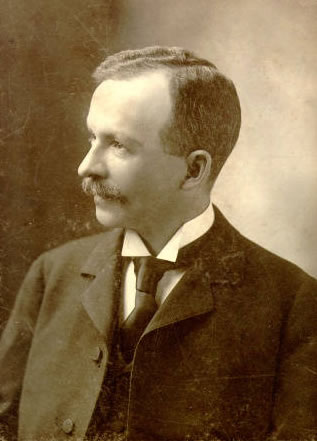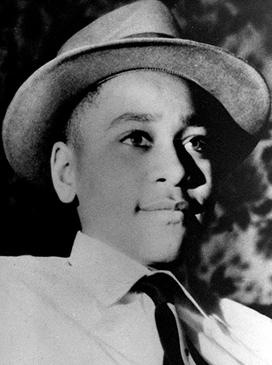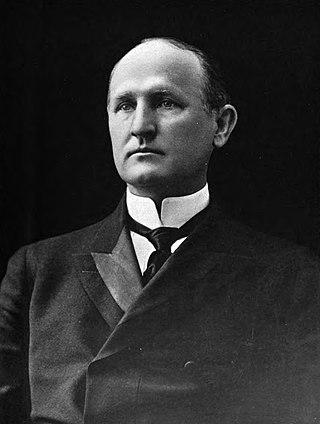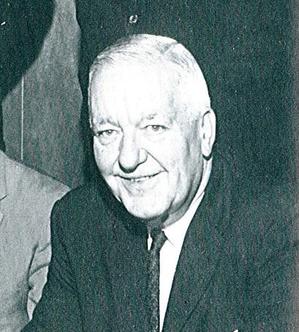
The civil rights movement was a nonviolent social movement and campaign from 1954 to 1968 in the United States to abolish legalized racial segregation, discrimination, and disenfranchisement in the country. The movement had its origins in the Reconstruction era during the late 19th century and had its modern roots in the 1940s, although the movement made its largest legislative gains in the 1960s after years of direct actions and grassroots protests. The social movement's major nonviolent resistance and civil disobedience campaigns eventually secured new protections in federal law for the civil rights of all Americans.

Oxford is a town in Granville County, North Carolina, United States, with a population of 8,628 as of the 2020 census. It is the county seat of Granville County.

Charles Waddell Chesnutt was an American author, essayist, political activist and lawyer, best known for his novels and short stories exploring complex issues of racial and social identity in the post-Civil War South. Two of his books were adapted as silent films in 1926 and 1927 by the African-American director and producer Oscar Micheaux. Following the Civil Rights Movement during the 20th century, interest in the works of Chesnutt was revived. Several of his books were published in new editions, and he received formal recognition. A commemorative stamp was printed in 2008.

Emmett Louis Till was an African American boy who was abducted, tortured, and lynched in Mississippi in 1955 at the age of 14, after being accused of offending a white woman, Carolyn Bryant, in her family's grocery store. The brutality of his murder and the acquittal of his killers drew attention to the long history of violent persecution of African Americans in the United States. Till posthumously became an icon of the civil rights movement.

Charles Brantley Aycock was the 50th governor of the U.S. state of North Carolina from 1901 to 1905. After starting his career as a lawyer and teacher, he became active in the Democratic Party during the party's Solid South period, and made his reputation as a prominent segregationist.

Robert Franklin Williams was an American civil rights leader and author best known for serving as president of the Monroe, North Carolina chapter of the NAACP in the 1950s and into 1961. He succeeded in integrating the local public library and swimming pool in Monroe. At a time of high racial tension and official abuses, Williams promoted armed Black self-defense in the United States. In addition, he helped gain support for gubernatorial pardons in 1959 for two young African-American boys who had received lengthy reformatory sentences in what was known as the Kissing Case of 1958.
Henry Dortress "Dickie" Marrow Jr. was an African-American veteran of the Army and known for being shot and killed by whites in a racial confrontation in Oxford, North Carolina at the age of 23. His murder and the acquittal of two suspects by an all-white jury were catalysts for a renewal of civil rights actions in the county seat. Public facilities and businesses had remained segregated six years after passage of national civil rights legislation.
The civil rights movement (1896–1954) was a long, primarily nonviolent action to bring full civil rights and equality under the law to all Americans. The era has had a lasting impact on American society – in its tactics, the increased social and legal acceptance of civil rights, and in its exposure of the prevalence and cost of racism.
John Chavis was a free Black educator and Presbyterian minister in the American South during the early 19th century. Born in Oxford, North Carolina, he fought for the Continental Army during the American Revolutionary War. He was the first African American known to attend college in the U.S., though it is not clear if he graduated. He studied with John Witherspoon at the College of New Jersey and finished his studies at Liberty Hall Academy in Virginia, where he was licensed to preach. Later, while working in Raleigh, North Carolina, he established a private school that was highly regarded and attended by both white and Black students.
Timothy B. Tyson is an American writer and historian who specializes in the issues of culture, religion, and race associated with the Civil Rights Movement. He is a senior research scholar at the Center for Documentary Studies at Duke University and an adjunct professor of American Studies at the University of North Carolina.

The Lillian Smith Book Awards' are an award which honors those authors who, through their outstanding writing about the American South, carry on Lillian Smith's legacy of elucidating the condition of racial and social inequity and proposing a vision of justice and human understanding. The award is jointly presented by the Southern Regional Council and the University of Georgia Libraries.

Floyd Bixler McKissick was an American lawyer and civil rights activist. He became the first African-American student at the University of North Carolina School of Law. In 1966 he became leader of CORE, the Congress of Racial Equality, taking over from James Farmer. A supporter of Black Power, he turned CORE into a more radical movement. In 1968, McKissick left CORE to found Soul City in Warren County, North Carolina. He was an active Republican and endorsed Richard Nixon for president that year, and the federal government, under President Nixon, supported Soul City. He became a state district court judge in 1990 and died on April 28, 1991. He was a member of Alpha Phi Alpha fraternity.

The Wilmington Ten were nine young men and a woman who were wrongfully convicted in 1971 in Wilmington, North Carolina, of arson and conspiracy. Most were sentenced to 29 years in prison, and all ten served nearly a decade in jail before an appeal won their release. The case became an international cause célèbre, in which many critics of the city and state characterized the activists as political prisoners.
Thaddeus Stem Jr. (1916–1980) of Oxford, North Carolina was an American poet, author and newspaper columnist. His work frequently was published in the Raleigh News & Observer and The Pilot. He also wrote or co-wrote 16 books. The major works included The Animal Fair (1960), Entries from Oxford (1971), Senator Sam Ervin's Best Stories (1973), and Thad Stem's Ark (1979). He was honored with the North Carolina Award for Literature in 1974.

Benjamin Franklin Chavis Jr. is an African-American activist, author, journalist, and the current president and CEO of the National Newspaper Publishers Association. He serves as national co-chair for the political organization No Labels.

William Gilmore "Bill" Enloe was an American businessman and politician who served as the Mayor of Raleigh, North Carolina from 1957 to 1963. Enloe was born in South Carolina and sold popcorn before moving to North Carolina and taking up work with North Carolina Theatres, Inc. In 1953 he was elected to the City Council of Raleigh. Four years later he was elected Mayor. During his tenure the American South was permeated by civil unrest due to racial segregation. Considered a moderate on civil rights, Enloe criticized black demonstrators and resisted efforts to integrate the theaters he managed, but he eventually compromised and appointed a committee to oversee the desegregation of Raleigh businesses. He left office in 1963, but returned to the city council in 1971. He died the following year. William G. Enloe High School in Raleigh was named in his honor.

Golden Asro Frinks was an American civil rights activist and a Southern Christian Leadership Conference (SCLC) field secretary who represented the New Bern, North Carolina SCLC chapter. He is best known as a principal civil rights organizer in North Carolina during the 1960s.
The Royal Ice Cream sit-in was a nonviolent protest in Durham, North Carolina, that led to a court case on the legality of segregated facilities. The demonstration took place on June 23, 1957 when a group of African American protesters, led by Reverend Douglas E. Moore, entered the Royal Ice Cream Parlor and sat in the section reserved for white patrons. When asked to move, the protesters refused and were arrested for trespassing. The case was appealed unsuccessfully to the County and State Superior Courts.

African-American North Carolinians or Black North Carolinians are residents of the state of North Carolina who are of African ancestry. As of the 2010 U.S. Census, African Americans were 22% of the state's population. African enslaved people were brought to North Carolina during the slave trade.

Blood Done Sign My Name is a 2010 American drama film written and directed by Jeb Stuart and starring Ricky Schroder, Omar Benson Miller, Michael Rooker, and Nate Parker. It is based on the autobiographical book Blood Done Sign My Name (2004) by historian Timothy Tyson.














